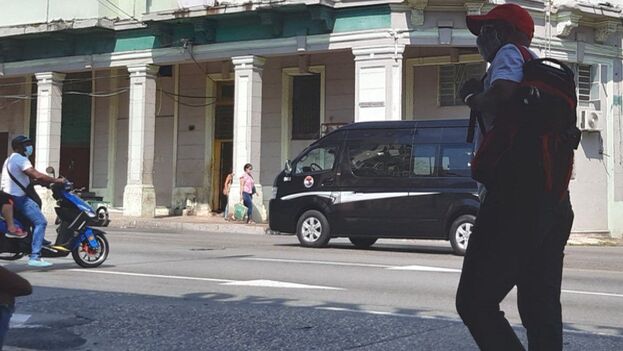
![]() 14ymedio, Yoani Sanchez, Generation Y, Havana, 14 October 2021 — They are dressed in civilian clothes and pretend to wait for the bus or to converse on a street corner, but everyone knows that they are segurosos, the popular word applied to agents of the dreaded political police. Their presence has increased in Cuba’s streets since the popular protests of July 11 and is expected to grow even more, as November 15 approaches, the date chosen by the activists platform Archipiélago to carry out a peaceful march.
14ymedio, Yoani Sanchez, Generation Y, Havana, 14 October 2021 — They are dressed in civilian clothes and pretend to wait for the bus or to converse on a street corner, but everyone knows that they are segurosos, the popular word applied to agents of the dreaded political police. Their presence has increased in Cuba’s streets since the popular protests of July 11 and is expected to grow even more, as November 15 approaches, the date chosen by the activists platform Archipiélago to carry out a peaceful march.
Using current legislation to their advantage, several young people submitted requests to local authorities — in at least six provinces — to demonstrate on November 20. Those who wrote the text appealed to the guarantees provided by the Constitution to respect the rights of assembly, demonstration and association. In addition, they asked the authorities to order that the country’s security forces provide the protesters with “due protection.” That letter was like stirring up the hornet’s nest.
Immediately, the official spokespeople began to call the organizers of the march “mercenaries of the empire,” some of them have been threatened by State Security, their mobile phone services cut off, and their homes put under surveillance. All the bullets of the assassination of reputation and the pressure on their closest relatives have fallen on these young people to advise them not to continue with such efforts.
A few days after the missive was delivered, the ruling party pulled out of its sleeve the announcement that a national military exercise was going to be held on the proposed date of the demonstrations, in clear response to the activists’ request. But they were not intimidated and brought the call to march forward to November 15, and submitted the documents to the local leaders again. This Tuesday, the government’s response has been categorical: it considers the initiative to be “illegal” and calls it a “provocation for regime change.”
In this way, officialdom acts with no surprises, but it is also committed to a dangerous position. The Plaza of the Revolution has chosen not to allow even a millimeter of public dissent, it wants to extend for more time these 62 years without legal marches of citizen disagreement, without workers who can take to the streets demanding better wages, or political opponents who show in a plaza their criticism of the Executive. Castroism has decided to continue showing itself unbreakable.
However, a Japanese proverb says that “the bamboo that bends is stronger than the oak that resists.” Not giving in, not choosing to permit the march and locking oneself into intransigence can be one of the gravest mistakes leaders make in the system’s death throes. After the demonstration of popular exhaustion that Cubans staged in the summer, choosing the heavy hand and repression is like shooting oneself in the foot. They could be accelerating their downfall and, in the worst case, leading the country into civil war. In a nutshell, they don’t know what they’re doing.
_____________
This text was originally published on the Deutsche Welle website for Latin America.
____________
COLLABORATE WITH OUR WORK: The 14ymedio team is committed to practicing serious journalism that reflects Cuba’s reality in all its depth. Thank you for joining us on this long journey. We invite you to continue supporting us by becoming a member of 14ymedio now. Together we can continue transforming journalism in Cuba.
